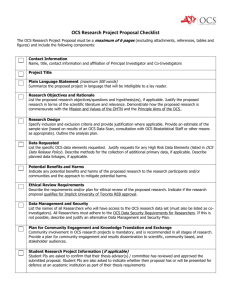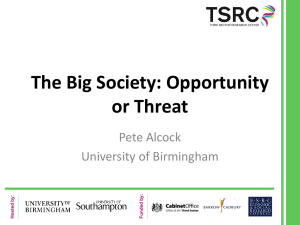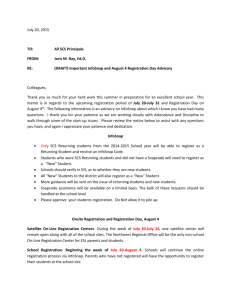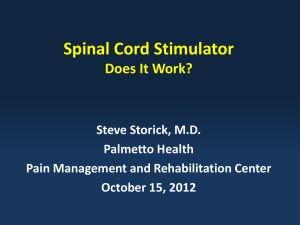Career Success - gender in management special interest group
advertisement
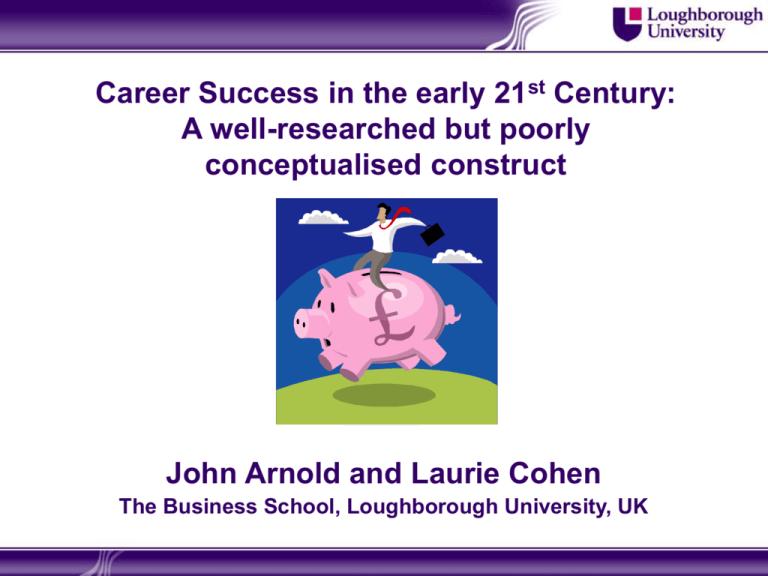
Career Success in the early 21st Century: A well-researched but poorly conceptualised construct John Arnold and Laurie Cohen The Business School, Loughborough University, UK Our aims To offer a picture of major themes and issues arising from recent research and theory on indicators and predictors of career success To identify what we see as the key developments needed in research and theory To pay attention to gender along the way 2 Definitions Career: The evolving sequence of a person’s work experiences over time (Arthur, Hall & Lawrence, 1989) Career Success: The accomplishment of desirable work-related outcomes at any point in a person’s work experiences over time (Arthur, Khapova, & Wilderom, 2005) 3 Research output about career success Articles on Web of Knowledge with “career success” as a keyword: 4 1970s 1980s 1990s 5 37 116 2000s 353 Research output about career success Articles on Web of Knowledge with “career success” and (“gender” or “women”) as keywords: 1970s 1980s 1990s 2000s 5 1 2 50 147 Objective vs subjective career success The distinction that is made all the time. Objective Career Success (OCS): Verifiable, measureable, and directly observable attainments Subjective Career Success (SCS): An individual’s reactions to his or her unfolding career experiences (from Hughes, 1937; Heslin, 2005) 6 “Objective” Earnings Rate of earnings growth Status Rate of Advancement (Lack of) involuntary unemployment Qualifications achieved/ documented evidence of marketable skills Bonuses/fringe benefits Informal power/influence Job or financial security 7 v. “Subjective” Career satisfaction Job satisfaction Balancing career and family Being where one wants to be Self-efficacy Clear career identity Sense of safety, marketability or employability Achievement of personally meaningful goals OCS and SCS aren’t as different as they look Contrary to what is often assumed, OCS indicators are not always easily observed Some measurement and construct validity issues occur with both OCS and SCS Career satisfaction is quite often measured with questions regarding satisfaction with one’s OCS – not very imaginative! OCS indicators often depend on someone else’s subjective judgement e.g. whether the boss gives us a pay rise They seem to influence each other: interestingly there is some evidence that the SCS→OCS link is stronger than OCS→SCS. OCS & SCS are usually correlated between .2 and .3 In some contexts, people’s conception of their personal development is closely aligned to their movement through organizational structures 8 Which is more important: SCS or OCS? OCS because it represents the tangible resources and power (and consequent health and life expectancy) that accrue to different people in society and is in limited supply. SCS is a way of keeping people happy when they have few privileges (e.g. Nicholson and De Waal Andrews, 2005) SCS because it represents people’s freedom to drive their own career in line with their own values, and is potentially in unlimited supply. It frees them from OCS’s traditional assumptions about how to “make it” (e.g. Hall, 2002) Key question: SCS as liberation or a resigned response to oppression? 9 Gender and Career Success Criteria Women experience less OCS than men. Some small signs that the gap is decreasing. Typically no gender difference in SCS. Women value SCS criteria more highly relative to OCS criteria than men do. Women and men’s success may be evaluated (by others) on different criteria 10 Adorable women, expert men? Kirchler (1992) Examined newspaper obituaries of 477 male and 85 female managers 11 Words used more often for men than women Words used more often for women than men Expert Decision-maker Intelligent Entrepreneurial Adorable Faithful Courageous Amiable Possible patterns of women’s careers (1) Phase 1: Idealistic achievement: Emphasis on personal control, career satisfaction and achievement, and positive impact on others. Phase 2: Pragmatic endurance: Doing what has to be done, whilst managing multiple relationships and responsibilities. Less personal control; more dissatisfaction especially with organisations and managers. Phase 3: Re-inventive contribution: To organizations, families and communities, without losing sight of self. Careers as learning opportunities and a chance to make a difference to others. Source: O’Neil and Bilimoria (2005) 12 Possible patterns of women’s careers (2) Mainiero and Sullivan (2005) “Kaleidoscope Careers”: Early career: typical major concern is Challenge Mid career: typical major concern is Balance Late career: typical major concern is Authenticity Gersick and Kram (2002): Remarkable match between highachieving women’s career phases and Levinson’s theory, though some of the personal issues at each phase were a little different. Successive tasks seemed to be: Finding a role in life Making career-family trade-offs Coming into one’s own 13 Beyond OCS vs SCS as success criteria (1) Other-referent vs self-referent (Heslin, 2005). Do men and women show different emphases between or within these categories? Neglect of work-life balance in measures of career success (Heslin, 2005). To the extent that this is a bigger issue on average for women than for men, in what ways does the neglect distort our understanding? Little consideration of career success relative to career stage/career concerns. What might success look like for women during the “pragmatic endurance” phase? Or would success be avoiding that phase altogether? Lack of focus on avoiding losses (rather than making gains) and on what success might look like for people at the margins of the labour market e.g. forced migrants. A particular issue for “trailing spouses”? 14 Beyond OCS vs SCS (2) (From Dries et al, 2008) Inter-Personal Affect Recognition e.g. being recognised for one’s accomplishments Performance e.g. going to great lengths to achieve good things Co-operation e.g. having a good understanding with one’s employer Advancement e.g. getting promoted; climbing the ladder Experienced Contribution e.g. realizing that one person can make a world of difference in an organization Factual Contribution e.g. demonstrating that one is a valuable asset to the organization Security e.g. experiencing job security Creativity e.g. developing innovative, extraordinary ideas Work-Life Balance e.g. feeling healthy and happy, at home as well as at work Goal Attainment e.g. accomplishing one’s own goals Achievement Satisfaction e.g. being proud of oneself and one’s achievements Career Self-Management e.g. creating opportunities in life Achievement Intra-Personal 15 Beyond OCS vs SCS as success criteria (3) What is an outcome and what is a predictor? Arguably, in an uncertain career world we should focus more on how well people are equipped to deal with it, rather than what they achieve or how happy they are – at least in the short and medium term. Career-related Competencies e.g. Knowing How, Knowing Why and Knowing Whom (e.g. Eby et al, 2003) – but poorly conceptualized and measured Employability (e.g. Van der Heijden et al, 2009) Conceptualized in various ways; popular in social policy and starting to be in W & O Psychology Career Capital (e.g. Dickmann & Doherty, 2008) Accumulated economic, social and cultural resources 16 More radical approaches to success criteria (1) 1. Career Success as being able and willing to speak the language of the employer and/or customers/clients (e.g. knowing and using “buzz words”) (Cohen et al, 2009) Key question: conformist, or pursuing one’s own interests under the guise of representing the interests of others? 2. For people who cross national boundaries, part of career success is the ability to hold simultaneously global and local identities. Also, citizenship as an indicator of inclusion? 17 More radical approaches to success criteria (2) 3. Career Success as being able to construct narratives that satisfactorily explain one’s career to self and salient audiences (Sugarman, 2001) Key points: emphasises “construction” rather than “reaction”; Different narratives for different audiences Key questions: how can we define a “good” narrative, or set of narratives? How do people account for gaps between their narratives and dominant ones? Does this manifest itself differently for men and women? 18 Is the distinction between OCS and SCS useful? “Objective” indicators are meaningless until we attribute meaning to them More important questions to ask might concern: Whose interests are being served by these definitions of career success? Is there evidence of resistance to dominant criteria? If so, from whom and why? How do meanings of career success vary over time and space? 19 Predictors of career success - an early example Predictor Being a graduate of a top university Being married Having a non-working spouse Having a high performance rating Each 7 years of age Ambition (per level of hierarchy) Being male Working extra (one evening per week) Based on Judge et al. (1995). Population was US executives. Predictors are not cumulative! 20 $ Salary Value 31,000 28,000 22,000 12,000 10,000 9,000 6,500 4,000 Results of Ng et al (2005) meta-analysis Type of predictor Mean correlation with Salary Career Sat. Human Capital e.g. Hours worked, Work .21 .10 sponsorship, Training and skill devt, Supervisor support .13 .31 Socio-demographics e.g. Gender, White vs .20 .02 .18 .01 .11 .24 experience, Education level, Career planning, Social capital Organizational Sponsorship e.g. Career Non-white, Marital status, Age Gender specifically Stable Individual Differences e.g. “Big Five” personality, Proactivity, Locus of control, Cognitive ability 21 Problems with research on predictors of career success Many classifications of variables and predictions about them are distinctly arbitrary e.g. Ng et al’s contest mobility vs sponsored mobility It’s often not clear whether predictor variables are causal antecedents, statistical predictors or correlates (partly because much research is cross-sectional) What career success means to the people researched, and how it is understood in the wider context researched, is rarely examined There is probably some contamination between some predictors and some outcome measures, especially for SCS Although there are some theories that might help to explain what leads to career success, they are not comprehensive (nor do they claim to be) and they are rarely used systematically 22 Some interesting areas of research on predictors (1) 1. Mentoring Much research over many years. At last the demonstrated benefits are starting to catch up with the hype (e.g. Allen et al, 2004). 2. Social networks (e.g. Siebert et al, 2001). Evidence that the extent and nature of social networks is related to success. Longitudinal work is starting to appear. But network measures tend to be weak and how exactly networks affect success is still unclear, though it is somewhat theorised. 3. Career self-management (e.g. King, 2004). All the rhetoric on 21st century careers says that it is essential for success, but this is hard to demonstrate. Attention to the “dark side” of career self-management is beginning (e.g. Harris and Ogbonna, 2006). 23 Some interesting areas of research on predictors (2) 1. The role of prior organisational affiliations and their impact on the reputation of the individual (e.g. Hamori, 2007). 2. “Most of the important rules of the workplace are unspoken. Some people learn them; others do not.” (Sternberg et al, 2000). Why is this, and what role does tacit knowledge play in career success? 1 is highly contextual; 2 is highly individual (and also contextual). This shows the breadth of thinking needed. 24 Gender as a predictor of career success (1) Even within top management, women tend to get less attractive opportunities than men and their job moves reap fewer rewards. Some evidence that personality traits are related differently to women’s vs. men’s OCS e.g. “Agreeableness”. Some evidence of double or even triple jeopardy for women e.g. gender combined with age and/or ethnicity. The correlations of education level and hours worked with salary are stronger for women than for men (Ng et al, 2005) Career breaks (for any reason) hinder success even many years later. 25 Gender as a predictor of career success (2) Having a partner and family is more often positively related to success for men than for women. Women feel more ambivalence about engaging in politics than men do Women often have less easy access to careerenhancing social networks than men do Women tend to use different, and possibly less success-enhancing, impression management techniques than men do Attributions by gatekeepers of men’s and women’s motives, contributions and life preferences play a significant part in some of the findings on thjis slide and the previous one. 26 The social processes of career success? Size, composition and structural properties of social networks (e.g. structural holes, loose ties) Gender Number and nature of developmental relationships 27 Outcomes Access to and use of career helpers (Bosley et al, in press) Use of political behaviour Use of influence tactics Social support Aspects of OCS ?Aspects of SCS Decisions and perceptions of powerful others Conclusions (1) Criteria for assessing career success need: 28 Inclusion of process as well as outcome aspects Better matching with the individual’s circumstances, priorities and cultural milieu More careful attention to definition and measurement Innovative development via qualitative research and verbal as well as numerical data Better analysis of the meanings people attach to them, and why Conclusions (2) Research on predictors of career success needs: Careful attention to conceptual grouping of variables More rigorous theorising about why predictors might matter, and testing of the theory More careful attention to how social processes play a part in career success More attention to gender and other “demographic” variables as moderators rather than main effects 29 Conclusions (3) Three general points: Moves between countries (voluntary and involuntary, corporate and individual) offer rich insights into different forms of career success and how they evolve Perhaps the concept of career success could be extended to collectives (e.g. families; occupations) and more links made with work on the sociology of occupations, professions More use could be made of ideas from vocational psychology, such as career exploration and career-related self-efficacy 30 Discussion 31
